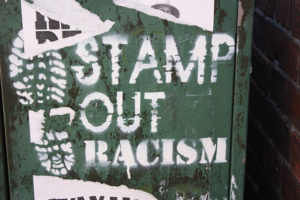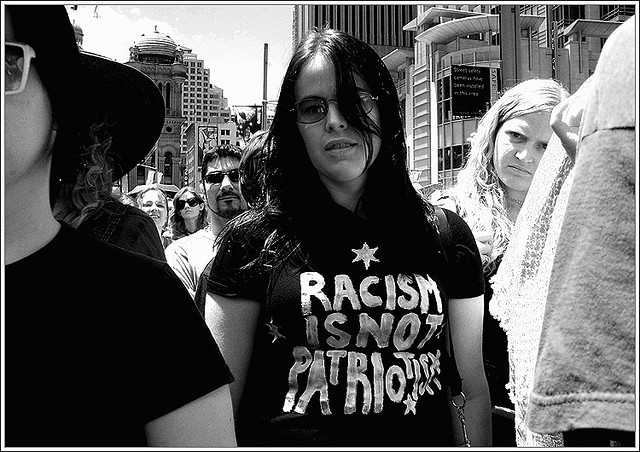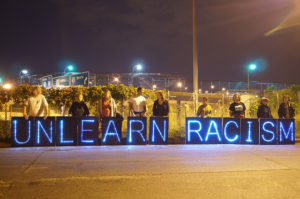by Sophia A. Strother
I struggled with this blog for weeks not really sure what I should discuss given so much that has transpired in my personal life and nationally that has had a profound effect on me. I wondered…should I discuss the dominant news on civil injustices against black men? The national spotlight on domestic violence in the sport and entertainment industry lately? Or my personal experience recently of losing my grandmother who played such a vital role in the woman I am today? So much to talk about and only a short space to do it in…
I finally settled on the life changing experience of deciding to take my grandmother into my household. I became her sole caregiver in January 2012. Millions of people across America have made this same decision, yet there has not been much attention or appreciation regarding the silent journey of heroism that such a decision renders.
Many know my story. I survived sexual abuse at the hands of my father, rape at the age of 14 which led to motherhood for me at 15. I also survived a mother who succumbed to drugs through my adolescence and adulthood. I’ve told this story through my book “Sophia: I’m Back.”
Many also know that my grandmother, Vivienne “Mattie” Strother Adams, was my appointed angel in my life. She took me and my newborn son in when I was 15 and helped to set the foundation of the woman that I am today. It was a no brainer that when she became terminally ill with Vascular Dementia and Congestive Heart Failure I was going to be HER angel by making sure she was well taken care of. So at the height of my career I took in my grandmother, homeless mother and two younger brothers making ours a mighty household of 8….yes, I said 8 … and, I was the ripe old age of 32.
Over two years, as my grandmother’s disease progressed, I resigned from my career with the State of Texas, withdrew from the public, and became lonely and desperate for resources and support. Unfortunately, offers of support were far and few between. If I found a support group it was only held once a month. My grandmother didn’t have Medicaid, so I only received 20 minutes of aid three times a week; everything else had to be paid out of pocket. I realized in that time that caregivers are grossly overlooked. Other people underestimate the grueling emotional toll caring for your loved one has on your own psyche.
I considered myself to be strong and forward thinking, but toward the end of my grandmother’s life this past November I found myself weakened and without purpose. I’m hoping more caregivers find the strength to reach out to one another. I also hope helping organizations realize that once a month isn’t sufficient to give emotional and mental release for caregivers.
I have a new found respect and bond with others that took the same journey as I did through caregiving.
Here are some tips that worked for me:
- Take time daily to step away — Whether it was 30 minutes to sit on the porch, or time to read a book. I had to make time for myself to clear my mind from the daily chores of caregiving.
- Reach out to others when feeling down — I used to feel guilty that I was sad about giving up my career or a large portion of my social life, however, reaching out to friends, former coworkers and community colleagues really helped. They kept me laughing and talking, and allowed me to vent.
- Seek out community resources. — There are several support groups in the community and they work. You need to talk to others who can truly understand. Also you might learn tips or new ways of caring for your loved one.
- Know your limits. — I had to accept I couldn’t physically do everything and it was okay to ask for help. Take advantage of volunteers who are willing to help or low-cost agencies that can also aid.
- Know that YOU ARE A BLESSING! — Even if you don’t get a pat on the back, you are a blessing to your loved one and it’s a blessing to be able to have the heart and means to care for them. Some of our loved ones mentally start to leave us, but try to remember the good times you had with them or how they were there for you and it helps ease you during the rough nights.
Act Locally Waco, thank you for having an outlet for the community to share and connect. I hope if you are in a similar situation and you are reading this that you will realize you’re not alone. Reach out to others for help as you travel through this journey of caregiving. A piece of my soul left me on November 9th, but I wouldn’t trade my experience and journey of caring for my grandmother…all the intimate time I had with her…now that she has gone to heaven, I appreciate that I didn’t miss it. TO ALL MY FELLOW CAREGIVERS I’M PRAYING FOR YOU AND YOU’RE MY HERO!
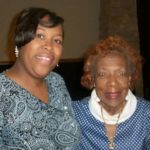 This Act Locally Waco blog post was written by Sophia A. Strother. Sophia is the CEO of Empowerment Driven by Knowledge Coalition & Trustworthy Consulting, a nonprofit community organization she founded. She has a master’s degree in marketing and is a licensed childcare administrator. Strother has endured much in her life—from sexual abuse and drug-addicted parents to being homeless and pregnant at 15. As an adult, Strother has struggled with and overcome her past demons and built a life and career around helping others. She shares her story in her book, “Sophia I’m Back” which is available online at Amazon.com and other channels.
This Act Locally Waco blog post was written by Sophia A. Strother. Sophia is the CEO of Empowerment Driven by Knowledge Coalition & Trustworthy Consulting, a nonprofit community organization she founded. She has a master’s degree in marketing and is a licensed childcare administrator. Strother has endured much in her life—from sexual abuse and drug-addicted parents to being homeless and pregnant at 15. As an adult, Strother has struggled with and overcome her past demons and built a life and career around helping others. She shares her story in her book, “Sophia I’m Back” which is available online at Amazon.com and other channels.
The Act Locally Waco blog publishes posts with a connection to these aspirations for Waco. If you are interested in writing for the Act Locally Waco Blog, please email [email protected] for more information.
by Sara Perry
One year ago this February, I had a life-changing experience. The setting was the Austin Music Hall with 1200 women seated round long farm tables for two days. None of us could really articulate WHY we were there, and we had no idea what to expect. There was no published program or speaker list. But we all had an undeniable sense of something important about to happen.
Over those two days, we heard worship led by Christy Nockels, teaching from international women authors and speakers, like Christine Caine and Jen Hatmaker, and testimonies from ordinary women just like us. We were given beautiful gifts from ministries around the world. We engaged in the deepest level of life ponderings with women who were strangers until we all stepped into that magical place together. We were all very aware that a lot of women had wanted to be there that day who could not secure a ticket. But we were the lucky ones.
God started something that day that has grown like a thousand wildfires around the world. It was a sense of purpose, meaning, and desire to be present in our lives and our communities. It was a battle against the fear that permanently resided in each of our minds, telling us we were too insignificant to make a difference. It was an awakening to the power of women joining together, supporting each other, and living like God is real and heaven really is coming.
I am thrilled to say, Waco, the wildfire has spread to our town. And it is called IF.
 The main question the IF movement asks is: IF God is real, how can we live like we really believe it? The leaders of IF are working tirelessly to gather, equip, and unleash women across denomination, age, and background to live out their God-given purpose, wherever they are. For some of us, that is all about being the best mom, student, or friend we can be. For others, it may be taking a leadership role or meeting a local need in the community. There are endless possibilities and all roles are equally important. Haven’t each of us at some point thought, what IS my purpose?
The main question the IF movement asks is: IF God is real, how can we live like we really believe it? The leaders of IF are working tirelessly to gather, equip, and unleash women across denomination, age, and background to live out their God-given purpose, wherever they are. For some of us, that is all about being the best mom, student, or friend we can be. For others, it may be taking a leadership role or meeting a local need in the community. There are endless possibilities and all roles are equally important. Haven’t each of us at some point thought, what IS my purpose?
Whatever it looks like for each of us, it becomes a lot easier to embrace our role when we have support and encouragement from those around us.
So on February 6-7 we will come together. The theme is FAITH in God’s promises. We will hear teachings via simulcast from Austin. We will engage in worship and take time to reflect and discuss with each other. We will enter strangers and no doubt leave with at least one new supporter, encourager, and friend. And I am certain each woman will leave emboldened for living out her God-given purpose, whatever it may be at this season in her life.
I invite every woman in Waco to consider attending. Locally it is free to attend, and there are 3 locations – Baylor campus, Columbus Avenue Baptist, and Harris Creek Baptist. Or you can even watch it on your own in your own living room. Go to http://www.ifgathering.com for all the details. You can also join the IF:Gathering Waco group on Facebook to receive updates and to see clips from IF leaders and speakers.
My life changed for the better one year ago this February. I have heard countless testimonies of others who had a similar experience. Don’t miss this opportunity to see what God has in store for us as women unite across Waco and the world.
Here are the links to register:
- Baylor campus: ifwaco.com (or email [email protected])
- Columbus Avenue Baptist: http://www.cabcwaco.org/if-gathering
- Harris Creek Baptist: http://harriscreek.org/events/general/item/1271-if-gathering
 This Act Locally Waco blog post was written by Sara Perry. Sara is a teacher, mom, wife, sister, and child of God. Faith and yoga are her stress management prescriptions for anyone who asks. She is passionate about unleashing women from the fear and uncertainty that prevents them from living life to the fullest, and fulfilling the role God has for them. She lives with her two preschoolers, husband, and two senior citizen doxies in Waco. She attends Grace Church and is one of many IF:Local leaders passionate about uniting women across Waco.
This Act Locally Waco blog post was written by Sara Perry. Sara is a teacher, mom, wife, sister, and child of God. Faith and yoga are her stress management prescriptions for anyone who asks. She is passionate about unleashing women from the fear and uncertainty that prevents them from living life to the fullest, and fulfilling the role God has for them. She lives with her two preschoolers, husband, and two senior citizen doxies in Waco. She attends Grace Church and is one of many IF:Local leaders passionate about uniting women across Waco.
The Act Locally Waco blog publishes posts with a connection to these aspirations for Waco. If you are interested in writing for the Act Locally Waco Blog, please email [email protected] for more information.
by Sabrina Gray
I have fond memories of my brother and me growing up in Denver, Colorado, with my grandmother, Ruth. We could count on our grandmother being there for us. She was a religious woman, and also mystical. For example, she had a way of always showing up at school. We never knew the time or the hour, but we knew she would just appear.
I remember a time when I was at the front of my 5th grade English class, and I could hear some snickering from behind me. I turned around and there she was in her polyester dress, arthritis socks and nursing shoes, sitting in the back of the room, smiling and nodding her head. She didn’t care much about dressing up or appearances (unless it was church), but she did care about showing up at the school unannounced. I really worked on doing the right things in class because I never wanted the teacher to call her with a bad report. (My brother, on the other hand, did not share in the same sentiment!) Mrs. Ruth was most concerned about how her grandbabies were doing and progressing in school. I don’t remember much conversation about college, but we were encouraged to do our best and graduate from high school. Everyone in the school from the front office staff to the cafeteria workers knew my grandmother. Back then there weren’t many restrictions on allowing parents to come and check on their kids at school. Times have definitely changed, but the need for parent involvement hasn’t.
So what is a “parent?” How is “parenthood” currently defined? According to the free dictionary by Farlex a “parent” is a person who adopts a child, a person who raises a child, a guardian, a protector, a person who looks after and nurtures a child.
Traditionally, we think of parents as a mother and a father, but the new normal may be a blended family, a same sex family and/or an extended family. Whatever the case, we know that all kids need someone in their life to take a vested interest in them and their academic success. I believe that every child needs at least one person in their life that believes in them and advocates for their best interest. For me, that person was my grandmother.
It turns out that the research supports this belief. Decades of research show that when parents are involved students have:
- Higher grades, test scores, and graduation rates,
- Better school attendance,
- Increased motivation, better self-esteem,
- Lower rates of suspension,
- Decreased use of drugs and alcohol,
- And, fewer instances of violent behavior.
 Parents, who read to their children, have books available, take trips, guide TV watching, and provide stimulating experiences contribute to student achievement. Family participation in education was twice as predictive of students’ academic success as family socioeconomic status. Some of the programs that called for more intensive parental involvement had effects that were 10 times more predictive of success.
Parents, who read to their children, have books available, take trips, guide TV watching, and provide stimulating experiences contribute to student achievement. Family participation in education was twice as predictive of students’ academic success as family socioeconomic status. Some of the programs that called for more intensive parental involvement had effects that were 10 times more predictive of success.
Without a doubt being an involved parent is important, but what does it mean to “be involved?” How do you do it? Do you have to magically make surprise classroom appearances in your arthritis socks? Well, that probably wouldn’t hurt, but here are some additional ideas:
- Start early – reading to your children before they can even understand the words helps to build lifelong positive associations with books and learning.
- Volunteer your time at your child’s school
- Join PTO or PTA
- Attend Parent training workshops and parent involvement conferences
- Show up for parent/teacher conferences throughout the school year
- Set positive examples for your child – let them see you reading, studying and learning
- Read to your child (this is worth repeating!)
- Check their homework
- Connect with your child’s school through any means available: email, text, blackboard messenger and social media for example
- Keep the lines of communication open with your child through frequent conversation. Even something as simple as consistently asking “How was school today?” or “How was your day today?” is important.
- Build a partnership with your child’s teachers. Remember…… there’s no “I” in team. It takes the parent(s) and the school working together to give your child the best possible chance to learn and thrive.
- Have fun and be flexible! Show your child that learning is something to seek after and enjoy…not something to put off or dread.
I’m personally grateful for my grandmother’s involvement in my upbringing and her ongoing encouragement for my brother and me to do our best. Getting involved has nothing to with your age, education, or your address. It has a lot to do with giving your child the best start in life that you can. Let’s remember it’s about our kids’ futures and improving their educational, emotional, social, and behavioral outcomes. Your involvement matters.
 This Act Locally Waco blog post was written by Sabrina Gray, current principal of Equal Opportunity Advancement Corp. (EOAC) -Waco Charter School. Sabrina graduated from Baylor University and completed her masters at Tarleton State University. She previously worked with WISD for over 21 years in many facets. Sabrina is married and has three adult children and one younger daughter in high school. Sabrina grew up with her grandmother in Denver, Colorado, and loves fishing, reading good mystery books and spending time with friends and family. If you would like to get in touch with Ms. Gray or learn more about the Waco Charter School, her email is [email protected].
This Act Locally Waco blog post was written by Sabrina Gray, current principal of Equal Opportunity Advancement Corp. (EOAC) -Waco Charter School. Sabrina graduated from Baylor University and completed her masters at Tarleton State University. She previously worked with WISD for over 21 years in many facets. Sabrina is married and has three adult children and one younger daughter in high school. Sabrina grew up with her grandmother in Denver, Colorado, and loves fishing, reading good mystery books and spending time with friends and family. If you would like to get in touch with Ms. Gray or learn more about the Waco Charter School, her email is [email protected].
The Act Locally Waco blog publishes posts with a connection to these aspirations for Waco. If you are interested in writing for the Act Locally Waco Blog, please email [email protected] for more information.
by Andy Hogue and Ross Tarpley
In October 2013, I (Andy) sat outside Common Grounds one splendid fall morning with Lauren Wolter, the director of a new program called The Philanthropy Lab. Based in Fort Worth, The Philanthropy Lab was working with Harvard, Yale, Stanford, and a few other elite universities to do something innovative: to help students learn about philanthropy while they do philanthropy, to enable students to understand the social sector even as they contribute to it. Ms. Wolter met me in Waco to ask if Baylor might wish to apply to partner with them.
As she explained the program over coffee, I was spellbound; it was a fascinating concept. The idea belonged to Geoffrey Raynor, the founding partner of Fort Worth-based Q Investments, who ventured, as those in his profession are wont to do, on something promising but risky. A thoughtful and seasoned giver himself, Mr. Raynor wondered if our culture might bend toward generosity if the country’s brightest young minds were afforded the chance to learn the skills of thoughtful giving—to research and understand public concerns, to assess the organizations daring to address those concerns, and to project the potential impact of philanthropic gifts, monetary and otherwise. All of this might be especially meaningful, Mr. Raynor ventured, if students could work with real money. And so, guided by his visionary leadership and innovative generosity, The Philanthropy Lab launched at the country’s top schools.
Ms. Wolter explained in our meeting that the program looked different at every university. Some housed it in economics, some in education or public policy. Some closely scripted the giving process, while others left it wide open for the students to shape. Most gave globally; some gave locally. To apply, we at Baylor were to propose in detail our own philanthropy course and our own process for giving. What would we aim to do, and how? In partnership with my colleague, Dr. Wes Null, we began to sketch it out.
The Idea
Our choices, technically, were unlimited, though one thing felt clear: Baylor and Waco both depend on one another to flourish, and our philanthropy program ought to reflect that. What about a unique process forged with that in mind: one that was purely local, built on durable, lasting, meaningful partnerships with the city’s nonprofit organizations; one that presented shared value to our students and our community, with local civic and nonprofit leaders giving knowledge and imagination and inspiration to our students, and our students in turn giving imagination, inspiration, and financial gifts back to our nonprofits; one that could afford collaboration between our best young minds and our best less-young minds to enrich life in our fair city? These were our hopes. This was our proposal. And lo and behold, they accepted it, granting us $100,000 to use in the first semester of the course (with more semesters still to come).
Buoyed by The Philanthropy Lab’s approval, we recruited thirty of Baylor’s best students from across disciplines and entered into a hopeful partnership with about 70 local nonprofit organizations. The terms were simply that these diverse organizations would open their doors, pitch ideas, lend expertise, and inspire imagination in our students about how, effectively, they might enrich the community with dollars and skills. In return, they became eligible for grant funding dependent upon the students’ selection at the end of a lengthy due diligence process.
The Process
On the first day of class it became clear to me that I (Ross) was surrounded by other students with different majors, different backgrounds and experiences, different passions and desires, but who were all interested in working toward good. As Baylor students driven by strivings for Christ in us and around us, this became an opportunity not only to understand philanthropy but also to practice it intentionally, a chance to serve and love our neighbors in Waco while experiencing the transformative power of giving.
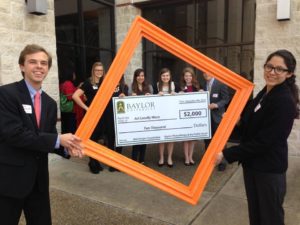 Five teams of six members were assigned a specific “subsector” of Waco nonprofits, from Health & Human Wellness; to Education & Mentoring; to Culture, Arts, & the Environment, among others. We quickly learned the participating organizations were only a small fraction of Waco’s several hundred local nonprofits—an encouraging realization that while our town does have a lot of need, there are lots of hearts and hands at work to alleviate it. The remainder of our process involved weeks of research, interviews, guidance from executive directors of local Waco foundations, and the painstaking selection of the final recipients of our grants—a task that was unsurprisingly difficult when there are so many good things aimed at enriching our community and meeting its needs.
Five teams of six members were assigned a specific “subsector” of Waco nonprofits, from Health & Human Wellness; to Education & Mentoring; to Culture, Arts, & the Environment, among others. We quickly learned the participating organizations were only a small fraction of Waco’s several hundred local nonprofits—an encouraging realization that while our town does have a lot of need, there are lots of hearts and hands at work to alleviate it. The remainder of our process involved weeks of research, interviews, guidance from executive directors of local Waco foundations, and the painstaking selection of the final recipients of our grants—a task that was unsurprisingly difficult when there are so many good things aimed at enriching our community and meeting its needs.
The (Transferable) Lessons
Our work and our learning over the course of the semester presented us with a startling realization: higher education is full of opportunities to learn about how to make money, how to handle it, how to get ahead and make one’s way in the world. But there is surprisingly little about how to give—not just of one’s money or in one’s profession, which are important, but also of one’s very self, which is more important.
Giving is complex, and there are many ways to do it. But as Richard Gunderman describes it, “the ultimate goal of philanthropy is not to reduce, prevent, or eliminate need. The ultimate goal of philanthropy is to promote sharing.” And this is an important takeaway—that one of the greatest gifts any human being could ever share with us, or any of us could share with another, is assistance in becoming the best persons, families, institutions, and communities we are capable of being.
Our financial gifts did not eliminate need or “fix” our community’s biggest concerns. They couldn’t, and no amount of financial giving could. The profound lesson is that we all can share of ourselves toward those ends, and when we share of ourselves, at least two things happen: 1) we express our belief in someone else, which promotes hope; 2) we can invite someone to share back with us, which promotes community. Any place marked by hope and community is a place, we’re convinced, with great potential for human flourishing. –– AH/RT
Whether you’re new to this journey or far on down the way, here are a few very quick aids to challenge your thinking and enhance your giving.
Web tools:
- Bridgespan’s guide to getting started
- What Are We Talking About When We Talk About Impact? (from UPenn’s Center for High Impact Philanthropy)
Books:
- Richard Gunderman, We Make a Life By What We Give
- Robert Payton & Michael Moody, Understanding Philanthropy: Its Meaning and Mission
A good Ted Talk:
- Kat Rosqueta, “Amplify the Money You Give”
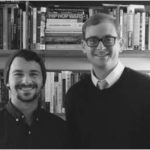 This Act Locally Waco blog post was written by Andy Hogue and Ross Tarpley. Andy has lived with his family in North Waco (with a brief excursion to the Pacific Northwest) since 2003. He is married to Tiffany, an attorney and Baylor administrator, and they have two girls, Anna (8) and Caroline (4). At Baylor Andy teaches courses on philanthropy, civic engagement, and a range of topics in American politics, particularly its intersections with religion and race. Ross, originally from Marshall, TX, is a senior Baylor Business Fellows major, studying Entrepreneurship and Religion. He loves singing, being at church, and healthy theological discussions. Upon graduation, Ross has no idea what he will do with his life, but options range from seminary, to teaching, to auditioning for a professional singing group.
This Act Locally Waco blog post was written by Andy Hogue and Ross Tarpley. Andy has lived with his family in North Waco (with a brief excursion to the Pacific Northwest) since 2003. He is married to Tiffany, an attorney and Baylor administrator, and they have two girls, Anna (8) and Caroline (4). At Baylor Andy teaches courses on philanthropy, civic engagement, and a range of topics in American politics, particularly its intersections with religion and race. Ross, originally from Marshall, TX, is a senior Baylor Business Fellows major, studying Entrepreneurship and Religion. He loves singing, being at church, and healthy theological discussions. Upon graduation, Ross has no idea what he will do with his life, but options range from seminary, to teaching, to auditioning for a professional singing group.
The Act Locally Waco blog publishes posts with a connection to these aspirations for Waco. If you are interested in writing for the Act Locally Waco Blog, please email [email protected] for more information.
By Phil York
Happy New Year!
The holiday leftovers are long-gone; decorations are starting to find their way back to storage reluctantly and the sound of holiday music is replaced with the resounding resolutions for the New Year.
This week, President Obama addressed Central High School in Phoenix, Arizona. He asked the audience to remain resolved about the continued American economic recovery. The President cited the housing market crash, especially the market of Arizona, as the source for economic decline. Now, in 2015, that same market is the engine for the Arizonan and American economic recovery.
A cut in mortgage insurance premiums on Federal Housing Administration loans was at the center of President Obama’s policy announcement this past week. Starting this month, mortgage premiums will drop from 1.35 percent to .85 for responsible and eligible applicants. According to the President’s remarks, the cut would attract 250,000 more people to buy homes over the next three years and allow for the typical homebuyer to save $900 a year.
Of course, any proposal by the White House is potentially subject to mixed reviews. Sen. Bob Corker, for example, responded to President Obama’s address by saying: “[this is] bad news for tax payers and is yet another irresponsible, head-scratching decision from the administration in regards to our nation’s housing finance system.”
Sadly, policy issues such as this one are often divisive at the national level. Fortunately, here in Waco, we are united as a community that embraces collaboration and collective impact. This new policy idea provides a good opening to discuss the importance of affordable housing for our community and to think about ways we can work together on this issue here at home.
Affordable Housing in Texas – Opportunities for Growth
“Affordable housing” is defined as that which does not require a household to spend more than 30% of gross annual income on housing. The National Low Income Housing Coalition reports in 2013 that the fair market rent for a two bedroom apartment in Texas is $867. In order to afford this level of rent without paying 30% of income, a household needs to make $34,671 annually. The median income in the Waco area is $32,239 compared to $51,900 state-wide. In short: affordable housing is a need in our community.
Homeownership and affordable housing are points of possible improvement for our local economy. Waco’s homeownership rate is around 47 percent compared to 63 percent in Texas and 65 percent nationally.
The statistics help us define the problem; they do not define Waco or the promise we have for growth in the near future.
Housing impacts all aspects of the American Dream.
At many points in his address, President Obama pointed to themes that we all associate with the American dream:
Education and the Hope of our Children: As we have discussed in previous posts, children who experience homelessness or unstable housing are sick four times more often than other children; go hungry at twice the rate of other children; and are twice as likely to have learning disabilities as non-homeless children. Our whole community benefits for generations when children (our future tax-payers, professionals, and civic leaders) grow up in a stable home.
Work Force and Tax base: The National Association of Home Builders reports that “home building generates substantial local economic activity, including new income and jobs for residents, and additional revenue for local governments.” The report wisely differentiates between the immediate impact felt directly thanks to construction efforts and the long term impact felt long after the dust settles and families close on homes. The annually recurring impact of building 100 single-family homes in a typical metro area includes 3.1 million in local income, 743,000 in taxes and other revenue for local government and 53 jobs. Housing makes a difference for our work force tax base.
Heroes and Service Members: The President reported that “since 2010 we helped bring 1/3 of our veterans who are homeless off the streets”. The White House and previous administrations identified veterans as a key demographic to prioritize in budget decisions. The housing first model implemented in some communities allows veterans to receive care they need while under a stable roof and to continue to have a stable future. Housing makes a difference for our Heroes.
How will You be Resolved in 2015?
President Obama connected to the audience by sharing his own path to homeownership. He said “buying a home is about investing; planting roots in a community…it is a sense of accomplishment that you are building something for your family and for the future”.
The President’s remarks echo the speech we hear from Habitat homeowners as they close on their homes. This sense of accomplishment is what makes it worth it to invest 300 hours of sweat equity; attend 12 “Homeownership College” courses; save $1,000 for an escrow payment, and commit to a 25-30 year zero-interest mortgage. Waco Habitat allows future Partner Families to realize their own dream of homeownership and along with it a brighter future for themselves and their children.
This year, you can be resolved and help Waco build affordable housing. Here are a few ways you can help:
Let your voice be heard:
Sign the petition Habitat for Humanity International generated. The purpose of the petition is to make affordable housing a Global priority: Click here for the Petition.
Contact your U.S. House representative and your U.S. Senators. If your Representative is Mr. Bill Flores, you have the convenience to contact Rep Bill Flores directly via email. The U.S. Senators from Texas are John Cornyn and Ted Cruz, click on their names to find out how to contact each of them. Ask that housing remains on their agenda in the New Year.
Get Involved:
Give of your time, talent and treasure to nonprofits that build a stronger McLennan County, here are three organizations that work directly on the issue of affordable housing:
One Last Note
This quote from John Wood, Professor Emeritus of Religion at Baylor, appeared in the Waco Trib the other day, “Business is not just a way to make money; it is primarily a way to serve others and to contribute to the common good.” Although nonprofits and government agencies are at the forefront of this discussion, the words of Professor Wood remind us of the calling we all have as Wacoans to make it our business to be resolved to contribute towards the constant care and improvement of our beloved community.
I hope you will join me in your unique way towards our shared efforts to build a stronger Waco in 2015.
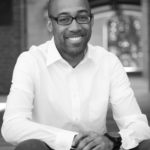 Phil York, Director of Development at Waco Habitat for Humanity, is a self-described “policy nerd;” he is also the Act Locally Waco housing and homelessness policy blogger. You can direct questions to Phil to [email protected]. Would you be interested in blogging for Act Locally Waco? If so please email [email protected].
Phil York, Director of Development at Waco Habitat for Humanity, is a self-described “policy nerd;” he is also the Act Locally Waco housing and homelessness policy blogger. You can direct questions to Phil to [email protected]. Would you be interested in blogging for Act Locally Waco? If so please email [email protected].
By Stephanie Korteweg
 Do you remember your childhood the way I remember mine?
Do you remember your childhood the way I remember mine?
Water gun fights, hot summer days, swimming pools, imagining that you somehow, by some miraculous event, can run faster than the day before. Clenched teeth, you muster up every ounce of your energy to run with this newfound supernatural strength. You run so hard that your body feels like at any moment you could come teetering down, but in sheer delight you are convinced that the next time you can run a little faster still.
I remember as a child I wanted to be a super hero. At the ripe age of three I was convinced that I could fly. Why not? I had seen plenty of super hero with capes flying on TV. They looked just like me, sans the fact that they were another gender or at least 20 years my elder- duh, they were human, and as luck would have it so was I!
So one day in my Wonder Woman PJ’s I decided to put my flying skills to the test. I climbed up on the couch, and with a half-hearted jump I landed on the ground – unhurt and undeterred. I needed to go all out if I was going to put my super powers to the test. Hands out- just like in the movies. It needed to be done. I needed to show the world human flight was possible. So this time, I decided I needed to get on the highest point of the couch, the arm rest, and jump from there.
I didn’t need to be a wimp about it anymore, it was all or nothing, baby. I was in! I was airborne- for a millisecond. The next second, is when my face made contact with the coffee table. It was then I decided to put my flying ventures to rest, at least for a while. My mom said, “Steph, you can’t fly-even though you saw it on TV, that’s make believe. You can do other things, but flying is not something you can do.” Feeling a bit disappointed, and a little silly, I had to make an early visit to the dentist.
 Fast Forward ten years and my dad had several rental properties that he would rent out to older widows. Every weekend we would load up the lawnmower and head out to these properties. I coveted the time with my dad, working together on the yard. It was hot, dusty and dirty, and I didn’t really like cutting lawns, but I do love time with my dad! Every time we would finish, my dad would MAKE us go and talk to the older ladies. We would always bring them lunch, and sit and talk to them. This was NOT my favorite part. I would ask my dad, “Why do I have to sit and talk with them? I don’t even know them. And why do we always bring them a meal?”
Fast Forward ten years and my dad had several rental properties that he would rent out to older widows. Every weekend we would load up the lawnmower and head out to these properties. I coveted the time with my dad, working together on the yard. It was hot, dusty and dirty, and I didn’t really like cutting lawns, but I do love time with my dad! Every time we would finish, my dad would MAKE us go and talk to the older ladies. We would always bring them lunch, and sit and talk to them. This was NOT my favorite part. I would ask my dad, “Why do I have to sit and talk with them? I don’t even know them. And why do we always bring them a meal?”
My dad, explained that these women don’t have any family nearby and they enjoyed talking to me. It was the least I could do – no excuses. I needed to sit with them, even if it was just enjoyable to them, because they had no one else.
Looking back on my life lived – having traveled to over 15 countries I see the same wonderment, joy and vitality in the children around the world. That thirst for what is possible. The question of what can I do? The need for guidance and safety in the boundaries, “no you can’t fly, but you can do other things.”
At the bottom of every basic human need is the need for connection. Taking time to sit and talk with someone else. Someone you wouldn’t normally talk to. Not for their good, but for yours. You see I learned something, when you take time to talk to someone, you place value on them. I am marked. I am convinced. People are worth it. Little or big, everyone needs someone.
 January is National Mentoring Month. There are about 15,000 students in WISD, and most of them need a champion. Someone who will sit and talk to them. There are lots of ways to get involved. Do it! If you have 30 minutes once a week- there is a place for you!
January is National Mentoring Month. There are about 15,000 students in WISD, and most of them need a champion. Someone who will sit and talk to them. There are lots of ways to get involved. Do it! If you have 30 minutes once a week- there is a place for you!
The beneficial effects of mentoring are well documented. The mentoring organizations in Waco have gathered together because we see the need for connection, guidance, and mentoring. Want to get involved? I’d love to hear from you! Go place value on a kid! You might just even find yourself enjoying it.
Resources for learning about mentoring in Waco:
Contact info for Stephanie: [email protected]
 Stephanie Korteweg is the Director of the STARS Mentoring Project at Antioch Community Church. She is happily married to Jeremy Korteweg. She graduated Baylor and taught in WISD for 12 years before becoming the Director of STARS. She and her husband love to travel and do anything outdoors. Their love for God is what compels them to serve others. She is committed to placing value on children and contributing to the betterment of the city.
Stephanie Korteweg is the Director of the STARS Mentoring Project at Antioch Community Church. She is happily married to Jeremy Korteweg. She graduated Baylor and taught in WISD for 12 years before becoming the Director of STARS. She and her husband love to travel and do anything outdoors. Their love for God is what compels them to serve others. She is committed to placing value on children and contributing to the betterment of the city.
“We are more alike, my friends, than we are unalike” –Maya Angelou
by Amber Jekot
In a city of residents dedicated to addressing poverty and hunger, in a city with nonprofits aplenty, in a city where zeal for addressing these concerns is even a part of our city’s governance, we find ourselves proud of this strange gem of a place – Waco, Texas. While our pride is justified, we must also admit the broken reality that dividing lines between neighborhoods, races, and socioeconomic classes linger despite our well-intentioned attempts to address them.
Perhaps part of the reason these divisions persist is the language we use and the story we tell about our community.
The language we use forms our reality. A recent study by Feeding Wisconsin found that the way we speak about hunger dictates how people respond – or do not respond – to this challenge. The study suggests that by utilizing shocking statistics, by telling the most devastating story we can conjure about those in poverty, and by neglecting to tell the success stories of our community, anti-hunger advocates actually do more harm than good for the cause of change – by unintentionally making hungry people seem “different.”
A distance between people is created when the pitiable reality of hunger conflicts with the universally held value that no human should have to experience hunger. This value is especially strong in America, the wealthiest country in the world, where, though the reality of hunger “should” no longer exist, 1 in 5 Americans are food insecure. The Feeding Wisconsin study found that when one’s values conflict strongly with reality, blame surfaces. In this case it is blame of the hungry people: “there must be something wrong with them for hunger to occur here.” With this in mind, maybe the story we tell about our community needs to be reoriented. Perhaps linguistic alterations can help break down barriers between “us” and “them.”
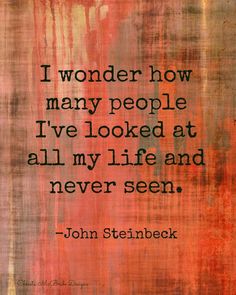 John Steinbeck, author of the classic The Grapes of Wrath, shows us the faces of hunger in a way that breaks down the barriers between seemingly disparate groups of people. The reader is drawn into the epic journey of a struggling, yet inspiringly resilient family who experiences hunger as a result of the 1930’s dust bowl. The reader is invited into a distinctively unfamiliar reality, yet becomes an ally of the protagonist, the Joad family unit, by developing a deep knowing and understanding. The storyteller invites us into an authentic relationship that bridges the distance between “them” and “us.”
John Steinbeck, author of the classic The Grapes of Wrath, shows us the faces of hunger in a way that breaks down the barriers between seemingly disparate groups of people. The reader is drawn into the epic journey of a struggling, yet inspiringly resilient family who experiences hunger as a result of the 1930’s dust bowl. The reader is invited into a distinctively unfamiliar reality, yet becomes an ally of the protagonist, the Joad family unit, by developing a deep knowing and understanding. The storyteller invites us into an authentic relationship that bridges the distance between “them” and “us.”
Steinbeck’s mantra throughout the book cautions the reader to be wary of confusing effects with causes: “These things are results, not causes. Results; not causes; results, not causes” (Steinbeck, p. 152). The hungry in Steinbeck’s novel and the hungry in the Feeding Wisconsin study are subject to the same common mis-assignment of cause. We don’t believe people should be hungry, yet people are hungry. This harsh reality rubs painfully against the grain of our values. So, to reduce the pain we come to believe that hungry people must be different from us. They must be the cause of their own plight. We need to question this assumption about cause with more depth.
For example, individuals who are having a difficult time paying for food are often blamed for making unwise financial decisions. They are criticized, for example, for purchasing simple pleasures when they could be saving up for rent. If we consider this criticism through the lens of the idea that we are all more alike than we are different, we can begin to recognize that spending beyond our means is an American problem, not just a problem for the poor. As a graduate student, I can attest to this. My fellow students and I sip our overpriced caffeine fixes while at the same time complaining about loans we’ll be paying back for the next fifteen years. The mortgage crisis that played a fundamental role in our country’s economic downturn was partially caused by middle class individuals spending beyond their means. Banks even participated in this irresponsible spending behavior by offering subprime loans.
College students, bankers, homeowners, and those who are struggling to buy the healthy food they need are far more alike than we are different. The difference between these groups of people is not just that one group is financially responsible while the other is irresponsible. We all make financially irresponsible decisions. At least part of the difference is that systems in place make it easier for some groups to recover from their irresponsibility while making it likely that others will fall farther behind. Paying back a payday loan, paying back credit card debt, and having the government help out a financial institution, are very different support systems with very different consequences.
The Feeding Wisconsin study found that for folks to recognize and acknowledge the whole range of causes of hunger, we must tell the story in a way that acknowledges that we’re all really more alike than we are different. The desire for financial security and breathing room within one’s budget, the need for someone to help us out every once in awhile, and the goal of striving towards a better life are universal values and needs, not just values and needs of a particular group of people. Narratives like Steinbeck’s Grapes of Wrath help to give faces of strength to those who need a little help and those who, in actuality, are much more like us than they are different. Just as Steinbeck narrates a story that bridges the gap between the “us” and “them,” so can we.
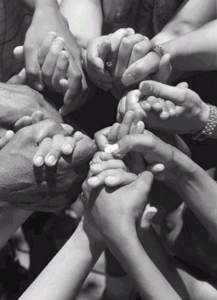 Stories of strength and resiliency of those who experience hunger are widespread in our city: the single mom who, never having maintained a living wage, is now taking night classes because she wants her children to have more opportunities than she ever had; the man who works 70 hour weeks just to give away his money to those in need because “he knows what the struggle is like;” the woman who skips a day of work to advocate for her child’s education and makes concessions to her own health on behalf of her family. These stories represent individuals who — not too unlike those who are well fed — have hopes and dreams for themselves and their families. They just need some support as they move towards their respective goals.
Stories of strength and resiliency of those who experience hunger are widespread in our city: the single mom who, never having maintained a living wage, is now taking night classes because she wants her children to have more opportunities than she ever had; the man who works 70 hour weeks just to give away his money to those in need because “he knows what the struggle is like;” the woman who skips a day of work to advocate for her child’s education and makes concessions to her own health on behalf of her family. These stories represent individuals who — not too unlike those who are well fed — have hopes and dreams for themselves and their families. They just need some support as they move towards their respective goals.
Our city exudes resiliency, strength, and potential. Let us breathe life into our community narrative and believe the best about our neighbors. Waco, join me in working to engage more with people who upon first glance seem different. Let’s tell a better story.
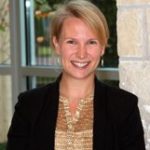 Today’s Act Locally Waco blog post is by Amber Jekot. Amber is an 8-year Waco resident who works as a graduate assistant at the Texas Hunger Initiative. She is finishing a masters of social work at Baylor University and a masters of divinity at Truett Seminary. She is passionate about the intersection between food, justice, and community and has been known to take trains without knowing her destination. You may contact her via email at [email protected].
Today’s Act Locally Waco blog post is by Amber Jekot. Amber is an 8-year Waco resident who works as a graduate assistant at the Texas Hunger Initiative. She is finishing a masters of social work at Baylor University and a masters of divinity at Truett Seminary. She is passionate about the intersection between food, justice, and community and has been known to take trains without knowing her destination. You may contact her via email at [email protected].
The Act Locally Waco blog publishes posts with a connection to these aspirations for Waco. If you are interested in writing for the Act Locally Waco Blog, please email [email protected] for more information.
Sources used in this post
Feeding Wisconsin (2014). Reframing hunger in America. Research presented at the Texas Hunger Initiative Together at the Table Hunger Summit.
For access to the presentation: https://baylor.app.box.com/s/xykec2gcq9s5m70i0obi/1/2601980659/22198738747/1
RTI Intl, Center for Health & Environ Modeling (Jul 2014). Current and prospective scope of hunger and food security in America: A review of current research. Research Triangle Park, NC: RTI International.
For the full report visit: http://www.rti.org/publications/abstract.cfm?pubid=22989
Steinbeck, J. (2006, 1939). The Grapes of Wrath. Penguin classics. New York: Penguin Books.
by Kyle Massey
In last week’s post, I challenged white readers to acknowledge their privilege, their whiteness, and indeed their racism. I have found when we are challenged for our whiteness, the tendency for most white people is to fall back on our sense of fairness, sensitivity, and democratic inclusiveness. Responses like “How can you call me racist?” are common. This defense question rebukes the assertion of privilege and contends “How can you call me, of all people, racist?” This type of comment is often followed by a recounting of various moral principles that go into great lengths to position most whites as “good people.” Statements like “What more can I do?”, or “Please tell me what I am doing wrong?” are questions frequent in these (often tense) exchanges. When told, a more explicit denial often commences, making extensive use of the word but, saying “Yeah, but do you see how that’s not my intention?” or “Yeah, but do you see the complexity of the situation, here?” The primary goal is self-preservation. Feeling good about oneself takes precedence over the difficult work of identifying and acknowledging whiteness and privilege.
Addressing white guilt or racism?
As I said last week, as a white man I, along with other antiracists born into a white supremacist society, continue to work at acknowledging and unpacking my own privilege. Born into a racist society, we find ourselves thrown into a situation that is not originally of our own making. To address this, some whites try to distance themselves from notions of whiteness and from racism, arguing they would unchoose these if it were possible. Whites often squarely position genocide, slavery, land theft, lynchings, and de jure segregation as part of a past that can no longer be changed. Dismissive notions like “the past cannot be changed and anyway slavery is illegal today” offer reassurance to some whites by discursively transporting themselves to a place of imagined innocence. As a cure to white guilt this is an effective strategy; but it does nothing to challenge racism, the actual problem.
Too often, antiracist activities are focused on alleviating our white guilt which keeps whiteness at the center of antiracism. To pursue social justice, however, we have to decenter whiteness from our efforts and programs for social change. Among other things, this means critically reevaluating our notions of morality: how we understand fairness, how we understand what it means to be a good person, how we understand what it means to be generous or sympathetic or tolerant or a good listener.
Inclusiveness for equity
As antiracists, we need to come together to work for meaningful change, and surely inclusiveness should be one of the central goals. Inclusion would seem to represent an unproblematic, pro-diversity stance, but it is often misused and should be considered carefully. Just as colorblindness shields whites from having to recognize or take responsibility for racist conditions, inclusion is often used to suppress the acknowledgement of conflicting interests. In my experience in schools and on college campuses, I have heard notions of inclusion invoked to criticize people of color for organizing among themselves. Some whites complain that Black fraternities and Black sororities, for example, are overt examples of racism since they seem to contradict efforts for inclusion. Similarly, a Black women’s network that organizes such things as breakfast groups and Bible studies among its members is sometimes criticized by white people for its non-inclusive nature. These criticisms harness a selective narrative of history and ignore the fact African Americans were excluded from joining white Greek organizations for many years. They silence the daily microaggressions experienced by minority populations, minimizing (and sometimes ridiculing) the importance of empowerment within community. Rather than disrupting these important social activities among marginalized members of our population, our efforts for inclusion should be focused on strategies for dismantling structural racism. Working for equity in our society’s institutions and policies, antiracists focus on achieving a fairer distribution of the benefits and burdens of public policy.
Charity vs. Social Justice
There are numerous causes and issues that need an antiracist framework if we are to realize real and lasting change. Whether our efforts are directed at issues in criminal justice, education, health care, employment, or housing, for example, we must work for social justice. Charitable acts such as donating to food banks or raising money for under-funded schools are essential to reach the immediate needs of disadvantaged in our society; but no amount of charity will ever be enough to bring about real change. Whereas charity is directed at the effects of injustice, its symptoms; efforts for social justice are directed at the root causes of social problems. In other words, social justice addresses the underlying structures or causes of these problems. So, while we should continue to ensure our food banks are well stocked to meet the immediate needs in our communities, we should also critically examine the reasons why so many people in our communities are living in poverty in the first place. And why is it that a disproportionate number of those in poverty are people of color?
Public education is of critical importance to all communities, and as antiracists we should be committed to equity in our education system. We should be asking important questions about current trends in our education system such as: “Why are schools that serve more students of color more often than not the same schools are the most underfunded?” and “Why are schools in low-income neighborhoods that serve a large number of students of color constantly under threat of being closed?” These negative consequences of our current “accountability” culture do indeed effect people of color and their communities much more so than other groups. This is a large part of why I have taken up some of these related issues in public education, advocating for new policies and legislation to help close the opportunity gap in our education system.
We should all get more informed about local efforts underway aimed at social justice, and ask ourselves how we can get involved. Groups to check in with include:
- Texas Kids Can’t Wait
- Texas Hunger Initiative
- Community Race Relations Coalition of Waco
- Act Locally Waco
 Kyle Massey is an educator, student, and scholar. Kyle lives and works in Waco, Texas. In addition to his fulltime job as a higher education administrator, in the evenings Kyle teaches undergraduate courses in geography and leadership studies. He is a PhD student at the University of Texas at Austin in the College of Education. Kyle’s research interests include topics related to global citizenship, geography education, and the ways in which various aspects of curriculum and teaching in higher education shape student learning experiences, especially with respect to social and cultural understandings. You can contact Kyle at [email protected], follow him on Twitter @kyledmassey, and check out his website at www.kyledmassey.com
Kyle Massey is an educator, student, and scholar. Kyle lives and works in Waco, Texas. In addition to his fulltime job as a higher education administrator, in the evenings Kyle teaches undergraduate courses in geography and leadership studies. He is a PhD student at the University of Texas at Austin in the College of Education. Kyle’s research interests include topics related to global citizenship, geography education, and the ways in which various aspects of curriculum and teaching in higher education shape student learning experiences, especially with respect to social and cultural understandings. You can contact Kyle at [email protected], follow him on Twitter @kyledmassey, and check out his website at www.kyledmassey.com
The Act Locally Waco blog publishes posts with a connection to these aspirations for Waco. If you are interested in writing for the Act Locally Waco Blog, please email [email protected] for more information.
Photo 3:
- license: https://creativecommons.org/licenses/by-nc-sa/2.0/
- Flickr user: Machine Made
Photo 4:
- license: https://creativecommons.org/licenses/by-nc-nd/2.0/
- Flckr user: Stephen Melkisethian
By Kyle Massey
I am aware that the title of this article may have alarmed you. In our society, people don’t usually go around proclaiming to be racist. Therefore, it probably catches your attention when I say “I’m white, and I’m racist”. Well, it’s true, I don’t deny my racism. This may seem provocative, but let me explain.
Our society is one that was built on, and continues to be, a system of exploitation and oppression of people of color by white people. This is historically based and institutionally perpetuated. This racist social structure is designed for white people to maintain and defend a system of wealth, power, and privilege. This structural racism—the forms of racism that act visibly and invisibly in our institutions—is a principal component of the fabric of our society, whether we see it or not, and manifests itself in practically every element of our social structures. Our nation’s policies and systems of education, immigration, [in]justice, healthcare, housing, and employment, for example, have been, and continue to be, deeply influenced by structural racism. That is, structural racism works through willing and unwilling actors through these social structures to produce and reproduce cumulative, durable, race-based inequalities to privilege the white majority.
It’s in the air we breathe
Structural racism is so deeply ingrained in our society, in everyday behaviors, practices, thoughts, and actions that exposure to it is inescapable (but not unresolvable). It is simply impossible to have grown up in a white supremacy as a member of the majority and not have absorbed racist beliefs or tendencies of some kind. It’s in the air we breathe. This is why white people contribute to the creation of a racist society. There, I said it: white people are racist.
If you’re a white person reading this, you may be feeling a bit defensive right now. You may be thinking to yourself that you are not racist because you have friends who are black or because you don’t go around yelling racist slurs at people of color. It is important to recognize that racism is not just outward and visible actions, it is also the biased ideas we might hold deep inside, that we don’t voice. Our racism takes many forms and because our white supremacist society has normalized and legitimated racist thoughts and actions for so long, white people are not always able to spot their own racism. The oppressed in our society, however, recognize it and are hurt by it every day… so if you’re having trouble identifying the ways you might show racism, just go ask some of your friends who are not white.
Although white people in our society perpetuate this state of racism, I am not suggesting that all white people feel hatred toward people of color or even harbor ill feelings about them. What I am saying is that all white people have, in some way, been privileged and socialized on the basis of race by our white supremacist (racist) society. I am complicit because I am a member of the white majority in a white supremacy – I am a member of the group that holds the power in our society. I have grown up in this environment while occupying this particular identity, and therefore I have taken on some of the prejudices.
Although this blog post focuses on race, we should also acknowledge that advantage and disadvantage works in different constellations and that social race is only one axis among many (ability, gender, economic status, religion, sexual orientation, etc.).
The shame is denying our privilege
It may not have necessarily been my fault that racist things have been ingrained in me because, as I have said, it’s impossible to avoid this in a white supremacist society. The most shameful and destructive part, however, is when white people deny it: when we deny our privilege, when we don’t own up to the damage we cause, and when we don’t put in the effort to understand it or to figure out how to transform ourselves. Instead of denying our racism, we must call it out and be intentional about working toward understanding and transformation. And it is work. While structural racism is pervasive and has been a major component in the framework our society, it is also very sophisticated, and, in a way, elegant. It easily disguises itself. Various forces within the system of structural racism continually work to deny, minimize, and ultimately uphold itself. Working to unpack it so the racism is recognizable can be challenging work for the privileged in society.
There is of course a massive variation in how racism manifests itself in and through us. Some white people commit murder and hate crimes on the basis of race. Some people belittle other people’s cultures. Some white people discriminate based on race in hiring processes within employment settings. For others, their racism manifests in less overt ways. Some people may laugh at racist jokes, for example, or cross the street when walking along a sidewalk to avoid crossing paths with an oncoming black pedestrian. Still others may observe racist acts committed by others and choose not to speak up. Such inaction is complicity. These less overt examples of racism, often called microaggressions, are certainly not of the same magnitude as violent hate crimes, but they do share the same origins and are intrinsically linked.
I didn’t ask to be racist. It’s not something that I want. But, whether or not I like it, I have been shaped by our dominant culture, our racist culture. Similarly, I didn’t ask for white privilege, but it was given to me. I cannot give it back any more than I could have chosen not to take it. What I can do is own it, and I do own my privilege. What I mean is that I work to identify it, describe it, and call it out with the hope of lessening it.
Racist by conditioning, antiracist by choice
Even more importantly, I am an antiracist. I’m racist by conditioning, but I am an antiracist by choice. I choose to challenge white privilege and the oppression of people of color. But, just because I choose to be an antiracist doesn’t mean that I no longer carry around some of the traces of racism to which I have been exposed and poisoned by all my life. So, fellow white people, although racism is part of who we are, it is not all of who we are. We can all make the choice to be an antiracist, an ally, an activist, or whatever you want to call it. But we can’t actually embody these roles in society unless we first recognize and deal with our own racism, not deny it. I believe it is important, perhaps even necessary, for true transformation that each white person in our society comes to a place where they are able to say, “I’m white and I’m racist and I’m going to do something about it”.
And doing something about it will be the focus of Part 2 of this blog series, which will be posted here next Sunday. This second post will focus on the various ways that all people, as antiracists, can work toward equity and inclusion in our community and in our society more broadly.
 Kyle Massey is an educator, student, and scholar. Kyle lives and works in Waco, Texas. In addition to his fulltime job as a higher education administrator, in the evenings Kyle teaches undergraduate courses in geography and leadership studies. He is a PhD student at the University of Texas at Austin in the College of Education. Kyle’s research interests include topics related to global citizenship, geography education, and the ways in which various aspects of curriculum and teaching in higher education shape student learning experiences, especially with respect to social and cultural understandings. You can contact Kyle at [email protected], follow him on Twitter @kyledmassey, and check out his website at www.kyledmassey.com
Kyle Massey is an educator, student, and scholar. Kyle lives and works in Waco, Texas. In addition to his fulltime job as a higher education administrator, in the evenings Kyle teaches undergraduate courses in geography and leadership studies. He is a PhD student at the University of Texas at Austin in the College of Education. Kyle’s research interests include topics related to global citizenship, geography education, and the ways in which various aspects of curriculum and teaching in higher education shape student learning experiences, especially with respect to social and cultural understandings. You can contact Kyle at [email protected], follow him on Twitter @kyledmassey, and check out his website at www.kyledmassey.com
The Act Locally Waco blog publishes posts with a connection to these aspirations for Waco. If you are interested in writing for the Act Locally Waco Blog, please email [email protected] for more information.
[Photo 1 by Flickr user pigeonpoo – used under Creative Commons licensing]
[Photo 2 by Flickr user Light Brigading – used under Creative Commons licensing]
by Kelly McDonald
The second Affordable Health Care Act Insurance Marketplace open enrollment period kicked off on November 15. Get Covered America along with the Family Health Center, Providence Hospital, Baylor Scott & White Hillcrest Medical Center, Heart of Central Texas Independent Living Center, and Planned Parenthood are hosting health insurance enrollment events and encouraging McLennan and surrounding residents to sign up for quality, affordable health coverage. The open enrollment and renewal period that began Saturday, November 15 runs through December 15 for health plans that start or renew on January 1, 2015.
Last open enrollment period over 733,000 Texans got covered (3,733 of those from McLennan County) and 8 out of 10 of them received financial help to pay for their monthly health insurance premiums. According to the 2012 U.S. Census (the most recent year for which data is available) 40,000 McClennan county residents were uninsured. With roughly 25% more health insurance companies and health plans available in the Marketplace this time around, the McLennan Health Insurance Marketplace Coalition wants to make sure that these uninsured residents and those renewing their healthcare plans (1) know about their new health insurance options, (2) know that financial assistance may be available to help them pay for their monthly premiums, and (3) know that there are bilingual in-person assisters in the community to help them with their application and to answer any questions they may have to #GetCovered and #StayCovered.
Throughout the county, residents will be able to meet with non-profit application counselors who can walk them through the sign-up process free of charge and determine how much financial help they may qualify for. Residents can go to https://getcoveredamerica.org/calculator for an estimate on what Marketplace insurance costs and the amount of financial assistance they may qualify for, and to https://www.getcoveredamerica.org/events/ to locate or sign up to host upcoming enrollment events.
It’s also important to know that some households will need 2015 coverage to avoid paying a fine when they file their income taxes. 2015 fines can be as high as 2% of annual taxable income per adult without coverage, and 1% per child. Some low income individuals and families are exempt from the penalty, but should still apply for coverage to learn all their options. Some family members may qualify for Medicaid or CHIP.
For more information about how the Open Enrollment period will work in McLennan County, please plan to attend the McLennan Health Insurance Marketplace Enrollment Event Kickoff. The information will be delivered in both English and Spanish.
What: McLennan Health Insurance Marketplace Enrollment Event Kickoff – English and Spanish
Where: South Waco Library 2737 S. 18th St., Waco, TX 76706
When: Tuesday, November 18, 2014 from 5:00p.m. – 8:00p.m.
Who: Providence Hospital, Heart of Central TX Independent Living Center, Planned Parenthood, Family Health Center, Baylor Scott & White Hillcrest Medical Center and Get Covered America
How: For more details please contact Kelly McDonald at (254) 405-2576 or [email protected].
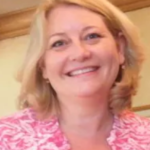 This post was written by Kelly McDonald. Kelly is the Community Outreach Organizer with Get Covered America. She’s also a legislative advocate for people with rare diseases, and on issues of genetic privacy. Ms . McDonald is an Executive Officer for the National PKU Alliance, and serves on the Newborn Screening advisory board of the Texas Legislature.
This post was written by Kelly McDonald. Kelly is the Community Outreach Organizer with Get Covered America. She’s also a legislative advocate for people with rare diseases, and on issues of genetic privacy. Ms . McDonald is an Executive Officer for the National PKU Alliance, and serves on the Newborn Screening advisory board of the Texas Legislature.
Would you be interested in blogging for Act Locally Waco? If so please email [email protected].

